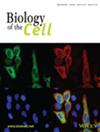3D FIB-SEM structural insights into the architecture of sub-pellicular microtubules of Trypanosoma cruzi epimastigotes
Abstract
Background information
Trypanosomatidae, which includes eukaryotic species agents of diseases like leishmaniasis, sleeping sickness, and Chagas disease, have special structures and organelles not found in mammalian cells. They present a layer of microtubules, known as subpellicular microtubules (SPMT), located underneath the plasma membrane and responsible for preserving cell morphology, cell polarity, the position of single copy organelles, and morphological changes that occur throughout the protozoan life cycle. Even though a lot of knowledge about the SPMT is available, we still do not know exactly how each microtubule in the system is organized in three dimensions. Here, we use focused ion beam scanning electron microscopy (FIB-SEM) to analyze the tridimensional organization of epimastigotes SPMT.
Results
The high-resolution 3D analyses revealed that certain microtubules of the SPMT end more prematurely than the neighboring ones.
Conclusions
These microtubules could (1) be shorter or (2) have the same length as the neighboring ones, assuming that those end up earlier at their other end, might be treadmilling/catastrophe events that have not yet been described in trypanosomatids.


 求助内容:
求助内容: 应助结果提醒方式:
应助结果提醒方式:


